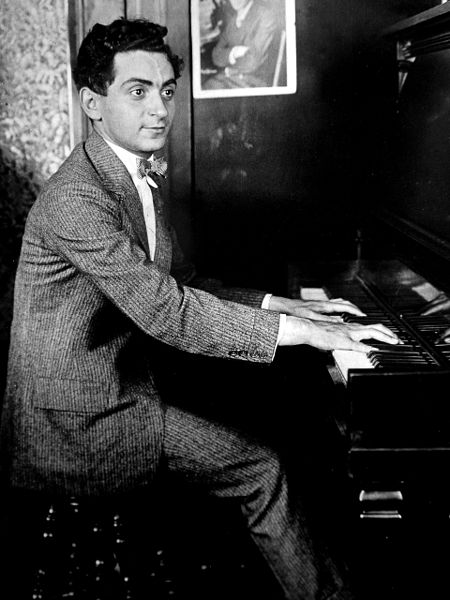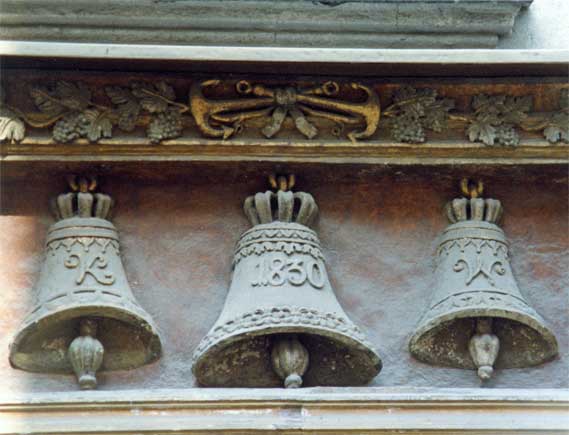By Jonathan Miller, on Thu Dec 26, 2013 at 10:00 AM ET From Virtual Jerusalem.com:
Our Top 12: The Jews Behind the Christmas Songs
12. The Christmas Song
Written by Mel Torme and Bob Wells.

Mel Torme was born to Russian Jewish parents. Bob Wells was born Robert Levinson.
The two were a well known songwriting partnership.
This song was born in Toluca Lake, CA on a hot July day, When Torme arrived at Wells’ house, he found a spiral note pad of paper with some words on it “Chestnuts roasting on an open fire, Jack Frost nipping at your nose, Yuletide Carols being sung by a choir, folks dressed up like Eskimos.”
Wells had wanted to write a song for a completely different season “to cool off.” Torme recognized the potential in the lyric, and the rest of the song was written in 35 minutes.
11. You’re a Mean One, Mr. Grinch
Written by Albert Hague

Hague was born as Albert Marcuse to a Jewish family in Berlin, Germany who considered their Jewish heritage a liability, and raised him as a Lutheran. This was written and recorded for the 1966 Dr. Seuss TV Holiday Special How The Grinch Stole Christmas. Seuss wrote the lyrics and Albert Hague wrote the music.
10. Holly Jolly Christmas
Written by Johnny Marks

Though he was a Jew, Marks was also one of the most famous Christmas songwriters of all time. He appears on our list no less than THREE Times.
He was brought in for this project after impressing executives with the success of Rudolph the Red Nosed Reindeer.
9. I’ve Got My Love to Keep Me Warm
Written by Irving Berlin

Born Israel Isidore Beilin, Berlin was an American composer and lyricist of Belarusian-Jewish origin. This song was one of the numbers from the 1937 film musical On The Avenue, to which Berlin contributed the majority of the music.
8. Winter Wonderland
Written by Felix Bernard

Born Felix William Bernhardt to a Jewish family in New York City, Bernard was known for his great compositions.
This became one of the most popular holiday songs of all time.
7. Let It Snow!
Written by Jule Styne and Sammy Cahn

Born in London as Julius Kerwin Stein to Jewish immigrants from the Ukraine, Styne was a famous American songwriter.
Cahn was born Samuel Cohen in NYC and became obsessed with music shortly after his bar mitzvah.
Although this song is associated with Christmas, there is zero mention of the holiday in the lyrics.
6. Silver Bells
Written by Jay Livingston and Ray Evans

Livingston was born Jacob Harold Levison in Pennsylvania. Evans, also a Jew, stepped away from all organized religion, including his religious heritage, later in life.
This famous duo is also behind the classic standards and Academy Award winning numbers, “Buttons and Bows” and “Que Sera, Sera (Whatever Will Be, Will Be).”
5. Rudolph the Red Nosed Reindeer
Written by Johnny Marks

Marks’ second appearance on our list! Let’s start with the fact that Rudolph was originally named Rollo, or Reginald! The story of Rudolph The Red-Nosed Reindeer was created in 1939 by Robert L. May, a copywriter for the Chicago-based Montgomery Ward department stores, as a promotional gift for customers. The stores had bought and distributed coloring books every Christmas and saw writing their own story as a way to save money. Marks was May’s brother in law, and after developing the lyrics and melody for it, the song was first released in 1949, selling an astonishing 2 million copies that year.
Click here for the rest of the list.
By John Y. Brown III, on Wed Dec 25, 2013 at 12:00 PM ET
It’s game time. Christmas-wise anyway.
Imagine you are in a football huddle late in the game.
A lot is on the line.
The quarterback unsnaps his helmet chinstrap and looks intensely but hopefully at each and every player
Then refastens his chinstrap and says to the team:
“You know what to do. We’ve practiced every conversation and family interaction for months now.
It’s Christmas Eve and Christmas Day and even though we may not be ready for them; they are ready for us.
This is it. And I say we are ready. Let’s do this thing!
Oh, and one more thing. Let’s make this the merriest damn Christmas ever!
On one. Break!”
===
The coolest thing about having teenagers on Christmas morning?It is 10:26am and although Santa and his team finished their work at around 2am, neither child is awake yet.Or even stirring.
Neither Johnny nor Maggie woke up naturally at the crack of dawn like they used to a few years ago.
And apparently don’t even bother to set their alarms as teens.
But I am up.
Waiting….
I am afraid to try to wake them for fear they may say, “Just 10 more minutes…”
So I am enjoying coffee and left overs from last night’s dessert and giving them a little more time to awaken, on teen time, for an exciting Christmas morning. Around noon.
===
 When our son was 5 we surprised him Christmas morning with a new puppy. He was ecstatic but as he held the new puppy my wife and I noticed the puppy was shivering. My wife commented to me several times asking me if I thought the shivering was normal and if our new puppy was OK. When our son was 5 we surprised him Christmas morning with a new puppy. He was ecstatic but as he held the new puppy my wife and I noticed the puppy was shivering. My wife commented to me several times asking me if I thought the shivering was normal and if our new puppy was OK.
Finally, our commonsense 5 year old son, Johnny, interrupted and said, “Mom, relax. The puppy has been on a sliegh all night long in cold weather. Of course she’s going to be shivering.”
I looked at my wife and laughing said, “Duh!”
===
My loved ones are so, so hard to Christmas shop for!!
Why do I think that?
Because everytime I slip away to try to shop for them I easily find a thing or two for me– but can never quite find a gift for them. And have to keep looking. It’s very frustrating.
But as frustrating experiences go, more fun than most.
The other night my wife and I split up to shop more efficiently and when we met back up I was carrying a bag with a men’s robe and a pair of slacks. “Who is that for?” Rebecca asked. “What? This?” I responded in mock surprise.
“It is for you,” I explained. “For you to give to me for Christmas. I just had you in mind and was thinking how I could make things easier on you”
I am pretty sure Rebecca believed me….Or at least was hoping I would find other ways to shop for Christmas that had a more direct benefit to her and others…. ; )
===
 Christmas Eve 2013 Today feels like that show where the winner got to take a shopping cart and rush through the store for exactly two minutes and could keep everything put in the cart during those two minutes.
Except in today’s game they make you pay for it all. At the end of your two minutes.It looked more fun the other way.
By RP Nation, on Wed Dec 25, 2013 at 11:00 AM ET From The RP’s sister, Jennifer Miller, on Quora:

The following article — torn, yellowed, matted, and framed — has hung on my wall my whole life. I think it gives a pretty good sense of who the Millers are supposed to be, and it launched my fascination with the writer, J. Soule Smith.
Published in 1899, it is an incredible piece of satire triggered by the Christmas Eve vandalism of my family’s store (Miller Brothers, at the lower left of the photo) in Lexington, Kentucky. The Millers had dared to violate Blue Laws by opening the doors to local children when Christmas fell on a Sunday. My guess is that the Starbucks now in that location will be open on Christmas Sunday 2011.
A JEWISH CHRISTMAS
By J. Soule Smith
The Gatling Gun, 1899
The accursed and despised Jew continues to get in his work. Like Shylock, he not only wants his pound of flesh but insists on taking the trimmings of blood, etc., along with it. He not only supplants his Christian neighbor in business, but he has been trying to vie with him in patriotism, and at last has begun to rob him of his Christmas. We ought to do something with the unregenerate Jew. In England they convert him at a guinea a head, and a thrifty Polish or Russian Jew can make a fair start in business by backsliding every time he gets strapped and being converted some more. Now and then they convert one in this country, and send him around to tell the country churches how they could convert the whole remnant of Israel if they would only put up enough money. So soon as they put up enough money, he invests it in a clothing store and fills the windows with cheap goods worth $2.00, but labeled “Marked down from $8.00 to $6.99.” Then the suckers come and buy, and the smart Jew laughs at the credulous Christian who converted him.
But some of the unregenerate, and unconverted, Jews persist in practicing Christian virtues while stubbornly adhering to the Jewish faith. They insist on living decently, practicing charity, and loving the human race – well knowing that these things are the peculiar prerogatives of Christians. They ought to be ashamed of themselves for acting so, but they are not. They seem to forget that by all our laws of fiction and philosophy, the Jew ought to be grasping and avaricious and the evil demon of his fellow-men. And one Jew, to my knowledge, got up a regular Santa Claus Christmas. It happened here in Lexington, in the heart of the Blue Grass region, where, according to the Northern idea, we kill “niggers” for breakfast and have cold roast pickaninny for supper; yet nobody killed the Jew. He is still alive, and selling ready-made clothing at the old stand.
Christmas of 1898 came on Sunday, as we all know. That is, it did in the United States, though in England some of the clergy decided it was not Sunday at all, since the prayer-book gave no form of worship for such a day; and of course it would be wrong to worship God except according to the prayer-book. But it was Sunday here – worse than a Puritanical Sabbath. The women had all the saloons closed, and toothless virgins stood on the street corners smelling the breath of every passing male. It had been decreed in England that the day was Christmas – a season of rejoicing – not the Sabbath, on which everybody had to be uncomfortable and make everybody else feel the same way. But the male and female old women, here, decided that nobody on earth should have any fun on that day if they could help it. But this unsalivated Jew had all the fun he wanted, and nobody dared stop him. He celebrated Christmas with a real Santa Claus.
That Jew sent out emissaries through the town for a month before, and sought for and found all the poor children – white, black and speckled – who had no parents or friends able or willing to give them Christmas presents. He docketed them by serial and sexual numbers, so that when entered on the books he knew the age, sex, and previous condition of servitude of each one. The Jew always has method in his madness. Then he gave each one of them a card of invitation to his store on Christmas day, and, with malice aforethought, and that diabolical cunning which is characteristic of the Jew, he purchased a present suitable for each child. He had no charitable organization to assist him, so far as I know, except a soft-eyed, sweet-voiced, large-hearted little Jewess – his sister – who, not so very long ago, perpetuated the memory of a dead brother by furnishing a room for poor patients in a Christian hospital. Maybe it would have been more Christian-like for her to have erected a marble mausoleum, but she did not see it in that light.
So this Jew and his sweet-hearted little sister perfected their plot against the Christian children. If they had tried such a game in Spain, three hundred years ago, they would both have been burned at the stake and their goods confiscated. It was well known in those days that Jews at Christian children for breakfast, and picked their bones over, cold, for supper. There was reason to suspect a similar intent in this case, for the children were required to be washed clean before they came. But even then they were not entirely palatable, for the Jew and his sister failed and refused to eat any of them, white or black.
But this Jew and his honey-hearted little sister had their fun all the same, and broke the Christian Sabbath into fragments, not knowing that one Jesus, a Jew, would have done just as they did had He been situated just as they were. He had spoken a parable – something about going into the highways and the by-ways for guests to a supper that was spread – but these unregenerate Jews knew nothing of that. I believe that Jesus is (not was) the Christ, the Son of the living God, and Himself living, to-day, in the hearts of those who worship the living God. I believe with the Brahmin, in the words of Krishna: “Of all Yogas, I respect him as the most devout who hath faith in me and who serveth me with a soul possessed of my spirit.” But this is not orthodox Christian doctrine as taught in the churches and the Temperance Unions and Young Men’s Christian Associations. And, therefore, these ignorant Jews conceived the notion that it was well to make people happy on Christmas day. Poor, foolish Jews! did they not know that the “Christian Sabbath” is a day of groaning and lamentation, and that Jesus Himself would be put in the workhouse for vagrancy if He applied for a Christmas gift at the door of a coal-oil millionaire’s house? Christ, on Euclid avenue, would be collared by the police before He had worked a miracle.
All Saturday night the good Christians of this town bombarded the front of this wicked Jew’s store with Roman candles and Chinese fire-crackers and sky-rockets and dynamite bombs, and other Christian devices for converting unregenerate Jews who obstinately refuse to become converted at a guinea apiece. Most of the Christians were drunk, but the obstinate Jew remained sober, and, finding he could transact no business, went home and went to bed. I suppose he dreamed of eating Christian babies barbecued, or broiled on toast like quail. He never told me his dream, because I did not ask him; but from what I know of Jews I suppose they eat Christian babies – in their sleep. I know they don’t eat them while awake.
Christmas was a bright and breezy Sunday – the atmosphere was clear and could bite without the assistance of a dentist. I went down to this Jew’s store to see how his iniquitous scheme would work out. The scene was unique. There were some Christian bums, left over from the night before, up and down the street, trying to batter their way into the side doors of saloons to get a bracer. Not a drop could they get, though some of them fell by the wayside. They were melancholy and unhappy, and the virtuous virgins and mincing children who passed them on the way to Sunday school drew aside from them in scorn and looked as stolidly miserable as the bums did. They went to church and called themselves “miserable sinners,” and I think they hit this combination about right.
This Jew was a sinner, but I don’t think he was miserable. He was busy in the back part of his store breaking the “Christian Sabbath” that these church people talk about, just like that other Jew, Jesus, broke the Jewish Sabbath – by doing good. In front of the store were two or three hundred children, white, black, yellow and albino – some too little to come by themselves – waiting for Santa Claus to come. At the appointed hour Santa Claus came in his yellow wagon – there was no snow, so he kept his sleigh in Lapland – and forced his way into the store through the excited crowd of youngsters. In the back part of the building he ascended his throne and waited for the little folks to come. A few policemen at the front door, some of them Irish – and every good Protestant knows that an Irish policeman is nearly as bad as a charitable Jew – admitted these little ones, a few at a time, so that there should be no crush and no confusion. These wicked policemen actually smiled and looked happy when they gave those Christian children into the clutches of the ravenous Jew. They were very ungodly police, else so ignorant that they did not know how sinful it was to be happy on the “Christian Sabbath.”
And those poor heathen children – niggers, negroes, mulattoes and white – were happy. Each one presented a card, and Santa gave a present – numbered as the card was. Then the child passed out the side door, with joy in its heart and the present in its arms. Most of them hurried home to tell of their good luck. Some stopped to peep into the bundle. The wicked Jew stood by Santa Claus, and actually gloated over the happiness of these poor creatures, as if a Jew had any right to share the joy of Christian children. His little sister shrunk back into an obscure corner behind the railing of the cashier’s desk and watched the procession of God’s poor, as it passed by, through what looked to me like tears of joy, filming her soft eyes so that their long silken lashes could not hide the gleam. What passed in that little lady’s soul I do not know; there are gray threads in her hair, but never a fibre in the warp and woof of her life that is not sweet and pure and gentle and lovable. For more than twenty years I have known her, and her heart is virgin and her hand is free. No man has ever touched the sanctity of her inner life. But I suspect that even she dared to be happy on this Christmas day while the truly good people were calling themselves “miserable sinners” at church. Alas! so easily corrupted am I, and so seductive the wiles of these wicked Jews, that I am afraid that I, too, was happy when I saw them doing Christ’s work and shaming the churches with their JEWISH CHRISTMAS.
By Lauren Mayer, on Wed Dec 25, 2013 at 8:30 AM ET Every now and then, a movie catch phrase comes along that both works perfectly in context, and comes in handy in real life. “Toto, I’ve a feeling we aren’t in Kansas anymore,” “Frankly, my dear, I don’t give a damn,” and “I’m mad as hell and I’m not going to take it anymore!” come to mind (as well as almost every line from “Blazing Saddles,” although most of those can’t be quoted without a detailed explanation and a PG-13 warning).
One of my personal favorites is from “The Princess Bride,” when Inigo Montoya hears his boss say ‘inconceivable’ and comments, “You keep using that word, I do not think that word means what you think it does.” (I’m the adult child of a former English teacher, meaning I cringe when I see mis-used words and grammatical mistakes, although I agree, “ending a sentence with a preposition is something up with which I will not put” is a little awkward.) So I was delighted to see that meme pop up in connection with the latest flap over “Duck Dynasty,” with family patriarch Phil Robertson being quoted in GQ (yeah, rednecks and GQ seem like an odd pairing to me, too!), expressing some colorfully homophobic and outdated racial views.
Of course, the biggest shocker to me was that anyone was shocked – did A&E really expect that a family of Louisiana evangelical duck-hunters would have enlightened views on race relations or gay rights? (Brings to mind another of my favorite film lines, when Claude Rains is trying to impress the Nazis in Casablanca by saying, “I’m shocked, shocked to find that gambling is going on in here” right before a dealer says “Your winnings, sir.”) But in their reactions, A&E and conservative politicians seem trying to outdo each other with cluelessness.
I find Mr. Robertson’s remarks offensive – but I find a lot of things offensive about reality TV, and I’m not so crazy about the whole idea of hunting defenseless little ducks – but I digress. Mr. Robertson has a right to express his views, as repugnant (or weird – read the actual article!) as they are, and his employers at A&E have a right to hire, fire, and suspend whomever they like. A&E announced a brief suspension, apparently trying to appease the large gay and black audience for the show (??), but opening up a huge can of worms in the process. Conservative politicians and peripheral-but-trying-to-stay-in-the-spotlight-characters declared their outrage that the media was censoring a good Christian and depriving him of his fundamental right of free speech. Ignoring, of course, the fact that no one’s right of free speech was infringed, because the Bill of Rights says nothing about anyone’s right to star on a reality television program.
By Lauren Mayer, on Wed Dec 18, 2013 at 8:30 AM ET
Last week I wrote about how Bill O’Reilly, Sarah Palin, et al were trying to stir up a frenzy over their imaginary ‘War on Christmas.’ Which at the time seemed like the height of going on the attack by trying to make oneself into a victim – but oh, ye of little faith, ye didn’t count on Megyn Kelly and ‘Santagate’.
In case you’ve been under a rock all week, a writer for Slate (an online magazine) wondered why traditional images of Santa Clause were always Caucasian, and she suggested that we consider race-free options (like a Penguin Claus – sort of like the Easter Bunny, or the Purim Hamster). This prompted Fox News anchor Megyn Kelly to trash her previous reputation for being more intelligent than her colleagues (remember her arguing with Karl Rove about the 2012 election results?), by convening a ‘panel’ to debate the issue, which as far as I could tell consisted of just one article (that hadn’t been very widely read until Kelly publicized it). She expressed her outrage that political correctness might trump truth, because it was a historical, verifiable fact that Santa is white – just like Jesus.
When critics began weighing in, Kelly immediately went on the defensive, claiming she was being attacked by race-baiting humor-less haters who didn’t get that the whole thing was tongue-in-cheek. On top of the fact that the original segment wasn’t particularly funny, one could also point to Kelly’s recent appearance on The Tonight Show, when she insisted she was a serious journalist, not an entertainer. But my biggest issue is that it’s hard to complain about being criticized when she’s the one who started criticizing in the first place.
The whole thing reminds me of sitcom fights where a younger sibling (Cindy Brady?) kicks an older one (Jan?) and when Jan retaliates, Cindy runs to mom, claiming “Jan is picking on me.” (And no, I don’t know what episode that was, it just sounds pretty plausible – plus I promised my own sons I’d stop embarrassing them by using them as examples.)
So as long as I’m in parental mode, I’d give Ms. Kelly the same advice most parents give their offspring – try to get along by putting yourself in each other’s shoes. And if you’re going to say something as silly as “Santa just IS white, it’s a historical, verifiable fact,” put yourself in the shoes of a liberally-inclined humorist and see if YOU could resist the temptation!
By Liz Roach, on Tue Dec 17, 2013 at 1:30 PM ET “Don’t bend; don’t water it down; don’t try to make it logical; don’t edit your own soul according to the fashion.” – Franz Kafka
While Kafka wasn’t talking about baking, he may as well have been. In the midst of hectic holiday preparations and festivities, I’m here to implore you: don’t water down your favorite recipes just because they may be rich or “unhealthy.” I won’t be so dramatic as to compare it to editing one’s soul…however! Don’t edit the soul of your dish. It’s the holidays. Live a little.
To that end, let’s talk about your to-do list. Have you finished everything? What about those last-minute presents you’ve been putting off? What about that hard to shop for uncle, or the boss who has everything? What about the acquaintance that unexpectedly gave you a gift, and now you’re scrambling to find something for them?
I’ve got a (relatively) quick solution for you: make them something. It’s meaningful, easy, and can be shared with a wide audience. Scads of recipes lie in wait for you within the Internet abyss: homemade jams, pickles, sauces, and hot chocolate are all great options.
 Last year, I baked chocolate hazelnut cookies for some of my cohort from a recipe I found online. Recipients liked them so much, I decided to make them a Christmas tradition. I’ve shared a copy of the recipe below, which I promise is not as complicated as it looks. Last year, I baked chocolate hazelnut cookies for some of my cohort from a recipe I found online. Recipients liked them so much, I decided to make them a Christmas tradition. I’ve shared a copy of the recipe below, which I promise is not as complicated as it looks.
For a savory option, you can’t go wrong with bourbon beer cheese. My cousin Amanda Cole and good friend Ashley Baker get together every December to whip up a batch, and my aunt Robyn has kindly shared the recipe for your consumption.
My only rule for these recipes is this: no low calorie substitutions allowed. You’ve got a foodie soul to protect.
What are you waiting for? Get cooking!
Baci di Dama Cookies
(from http://www.davidlebovitz.com/2012/11/baci-di-dama-cookies-recipe/)
About 45 cookies
Recipe by Terresa Murphy of La Cucina di Terresa
Ingredients:
1 1/4 cups (140g) hazelnuts, toasted and skinned
1 cup (140g) rice flour (or all-purpose flour)
3 1/2 ounces (100g) unsalted butter, at room temperature
1/2 cup (100g) sugar
Pinch of salt
2 ounces (55g) bittersweet or semisweet chocolate, chopped
Directions:
Toast the hazelnuts in a 325ºF (160ºC) for 10 to 15 minutes, until they’re a deep golden brown color and the skins are peeling away. Remove from the oven and as soon as they’re cool enough to handle, rub the hazelnuts in a tea towel (or if they’re not too hot, with your hands), until as much of the loose skins come off as possible. Let them cool completely before grinding them up.
1. Put the hazelnuts in the bowl of a food processor and pulse them until very fine; they should be the consistency of coarse polenta.
2. Transfer the ground nuts to a bowl and add the rice flour (if using all-purpose flour, sift it in). Cut the butter into pieces then add the butter, sugar, and salt to the dry ingredients. Use your hands to mix all the ingredients together until the butter is dispersed and completely incorporated. The dough should be very smooth and hold together. If not, knead it until it does.
3. Divide the dough into three equal pieces and roll each piece until it’s 3/4-inch (2cm) round. Try to get them as smooth as possible, with no cracks. If the dough is too long to work with as you roll them out, you can cut the dough at the midway point and work with it in batches.
Chill the dough logs until firm on a small baking sheet or dinner plate lined with plastic wrap or parchment paper. (Terresa recommends refrigerating them for 2-3 hours, but we put them in the freezer and they were cold within 15 minutes.)
4. Preheat oven to 325ºF (160ºC) and line two baking sheets with parchment paper or silicone baking mats.
5. Working with one length of dough at a time, keeping the others in the refrigerator or freezer, cut off equal-sized pieces using a knife or pastry cutter. The ideal is 5 grams each, if working with a scale. The fastest way to do it is to cut one to the right weight, then hold that one alongside the logs and use it as a template to cut the others. Once you’ve cut a length of dough, roll the pieces into nice little balls and place them on the baking sheet, slightly spaced apart.
If you don’t have a scale, simply roll the dough to the size of a marble, trying to keep them as similar in size as possible.
6. Continue cutting the dough and rolling it into little balls. Bake the cookies for 10 to 14 minutes, rotating the baking sheets in the oven midway during cooking, until the tops are lightly golden brown. Let the cookies cool completely.
7. In a clean, dry bowl set over a pan of barely simmering water, melt the chocolate until smooth. Put a chocolate chip-sized dollop of chocolate on the bottom of one cookie and take another cookie, and sandwich the two halves together.
Once filled, set the Baci di Dama sideways on a wire cooling rack until the chocolate is firm. The cookies will keep in an airtight container at room temperature for up to one week.
(Liz’s note: To get more bang for your buck out of the dough, I skip sandwiching the cookies together.)
Bourbon Beer Cheese
(adapted from Jonathan at Gratz Park chef Jonathan Lundy’s recipe http://jagp.info/bluegrass-table-cookbook.html)
Ingredients:
14 ounces sharp cheddar cheese
4 ounces smoked cheddar cheese
8 ounces cream cheese, softened
2 tablespoon caramelized onions
12 ounces Ky Bourbon Barrel Ale
1 tablespoon of Bourbon
1 tablespoon ground black pepper
1/2 teaspoon salt
1/2 teaspoon onion powder
1/2 teaspoon garlic powder
2 tablespoons paprika
1/4 teaspoon cayenne powder
Directions:
Shred cheddar cheeses. In food processor, puree caramelized onions and shredded cheeses. Slowly add beer. Process until smooth and add remaining ingredients, continuing to process until creamy smooth consistency.
Can be stored in refrigerator for up to 2 weeks. Make ahead as flavor takes a while to develop.
By Julie Rath, on Fri Dec 13, 2013 at 8:30 AM ET 
Looking for the perfect gift for your main squeeze? Stumped on what to request for yourself? From stocking stuffers to splurges, these 8 gifts have you covered.
 1) Grid-It Organizer – Keep your gear in line with this organizer. Great for at-home storage or travel. ($14) 1) Grid-It Organizer – Keep your gear in line with this organizer. Great for at-home storage or travel. ($14)
________________________________________________________
 2) Hook + Albert Fair Isle Socks – Hook + Albert makes stellar quality socks, and fair isle is a fitting pattern for holiday gifting. ($30) 2) Hook + Albert Fair Isle Socks – Hook + Albert makes stellar quality socks, and fair isle is a fitting pattern for holiday gifting. ($30)
________________________________________________________
 3) Bolin Webb Razor – Form meets function in this deliciously sleek Bolin Webb razor, featuring a MACH3 blade. ($80) 3) Bolin Webb Razor – Form meets function in this deliciously sleek Bolin Webb razor, featuring a MACH3 blade. ($80)
Read the rest of…
Julie Rath: 2013 Holiday Gift Guide
By John Y. Brown III, on Wed Dec 11, 2013 at 12:00 PM ET To judge others or not to judge others…. And the seeming paradoxical personality types behind that decision.
It appears to me the most judgmental people I have encountered in life also seem to be the least critical of themselves. In other words, they are ruthlessly hard on other people but seem tough on themselves not at all.
It’s not so much that they give themselves “a pass” —rather it jus.t never seems to occur to them to apply personally the same critiques, criticisms and value judgments they almost instinctively apply to others. They just don’t see the need.
Conversely, those people I have encountered who are the least judgmental (the most accepting and understanding of other people), usually judge themselves the hardest of all. They seem easily to find flaws within themselves but not in others. It’s not that they give other people a pass — it just doesn’t seem to occur to them to bother commenting on others weaknesses, shortcomings and failings that they seem to instinctively acknowledge in themselves. They just don’t see the point.
This does appear to be a paradox but I don’t believe it is at all. In fact, I think it makes perfect sense once understood. Those people who are deeply self-aware —aware of what makes them tick, aware of the things they could and should have done better, the regrets they have, their idiosyncrasies, shortcomings, character flaws and excesses— are far less judgmental of others for these same flaws because they can’t comfortably criticize others for things they know they have done (or could do) themselves. They tend also to be more generous and understanding–both with themselves and others. They may not approve of all parts of themselves but their deeper and broader self-awareness of the whole of themselves including their own imperfect and halting struggles to improve themselves, allows them to grant others the same dignity and respect they have learned to show to themselves.
By contrast, those who are quick to criticize, belittle and denounce the flaws, faults and hypocrisies of others are able to do so because they appear to imagine they are in some sort of protective cocoon that prevents them from ever having to wonder if they have done –or, God forbid, are doing— anything regrettable or foolish in their own life. They rarely appear to be struggling to improve their own personal imperfections but instead, if pressed about themselves, will draw deeper into their cocoon and resist the horrifying notion that they have anything at all to change about themselves. They are, in their view, not perfect– but a finished product that doesn’t need revisiting. They are done. And yet their alter-egos, those who don’t seem naturally inclined to scold, when confronted about a need to take a closer look at themselves, do so reflexively and gladly, comfortable in the knowledge they will be better off for the effort.
They are never done. Nor need cocoons to protect them.
Those who feel less inclined to judge others, I believe, are that way because they are able to lay down their pre-conceptions about themselves, others, and the world we all live in.
They learn at some point that the things they “think” they dislike about themselves, others and the world aren’t necessarily true. In other words, it’s not the “truth” they are upset about but the story they are assuming is true about themselves or some person, situation or circumstance. Often a story they have never questioned and in many cases aren’t even aware or even know where it came from or why they believe it. It’s just there. As a sort of invisible anchor responsible for their world view.
 Until one day they realize, often serendipitously, that something that they are mad about—some perceived personal flaw in themselves or another, some characteristic about another person or some unfair bias they see in a life situation working against them, isn’t what they thought it was at all. In fact, it may even be the exact opposite. The actual motive, reason, excuse, cause or purpose of something that has fueled their angst for many years is unmasked as false or non-existent. Until one day they realize, often serendipitously, that something that they are mad about—some perceived personal flaw in themselves or another, some characteristic about another person or some unfair bias they see in a life situation working against them, isn’t what they thought it was at all. In fact, it may even be the exact opposite. The actual motive, reason, excuse, cause or purpose of something that has fueled their angst for many years is unmasked as false or non-existent.
At that moment, these individuals truly get a glimpse of what a “blessing in disguise” really looks like. They learn a silver lining isn’t a lining at all but often just a clearing up of their own misconception based on the inability to see more than they—or any of us— are capable of seeing clearly at an earlier time.
Maybe this kind of humbling epiphany happens several times before these individuals really change. But at some point they realize that they are mad more at their preconceptions about the world than they are about the world itself —and as those preconceptions dissolve they are replaced by wisdom.
The more rigid and judgmental, it seems, take an opposite tack. They choose a course requiring them to spend a much greater deal of time trying to prove to themselves and others that the world does, indeed, fit into the cramped preconceptions they hold fast to with an increasing tenacity. It can be, to those observing, like watching a grown man who believes he can still fit into the same favorite outfit he wore as a self-assured boy. Or to be even more metaphorical, like a grown person trying to cram the world they are discovering into a cramped container they used as a child to fit their world into so that it made sense.
It isn’t that all their old ideas are wrong. It’s just that their container, comforting and familiar as it is, doesn’t have room for any new ideas. And there seems to be no inclination to make room by discarding old ideas that don’t work anymore. After a while the life of these individuals starts to seem more about protecting that old and comforting container they are trying to fit their world into rather than about discovering and understanding the world they are experiencing each day.
Their less critical brethren don’t cease to judge or make discriminating decisions. They just do so with a increasing awareness of the limited understanding on which they are making their life decisions. The awareness of what they “don’t know” turns out to be a compliment, not a threat, to what they do know. And humbly embracing what they don’t know becomes, ironically, one of the greatest and most useful tools for living in their life toolbox. And to stay with the metaphor, these individuals seem to have replaced their small and rusty container with an ever-changing and growing toolbox to help them navigate the world they encounter each new day. Their life becomes more about living forward with this malleable toolbox than living backward with a cramped container they aren’t sure how they ever came into possession of in the first place.
The “life container” and “life toolbox,” of course, represent a person’s world view. How a person views and navigates the world. Is life something that is “understood and done” or something else that we should face with greater humility and openness? At least that is what I am trying to communicate in my own inartful and inadequate way.
In trying to sum up what I am trying to say, it would sound something like this: “The more we are aware of what we don’t know — and acknowledging that what we believe we do know could just as easily be false –the more knowledgeable and informed we become. And the more confident and peaceful we find ourselves with the decisions we make. The more open we are to serendipity and Grace. And the richer our lives seem to become.”
In other words, yes, “Knowledge is Power.” But knowledge coupled with the humility of understanding how little we still know —or can ever know — is even more powerful.
By Lauren Mayer, on Wed Dec 11, 2013 at 8:30 AM ET Even in this rapidly changing world, we can always count on a few annual events – swallows returning to Capistrano, back-to-school sales, and of course the annual Fox News whining about the War on Christmas. According to their complaints, godless anti-religious socialists are trying to ruin the American way of life by asking that governments, schools, and even – gasp – retailers try to be inclusive. Pundits point to some horrid city council that decides to replace its annual Nativity scene with a ‘winter’ scene, or stores that use ‘Happy Holiday’ instead of ‘Merry Christmas’ in their advertisements.
Look, I get it – 77% of the country identifies as Christian, Christmas is a national holiday, and I expect to be bombarded by it for at least a month. And I’m not offended when a Target clerk wishes me Merry Christmas even as she rings up my Hanukkah candles & cards. But I also appreciate the occasional ‘Happy Holidays,’ acknowledging that some of us – in fact, 23% of us – don’t observe Christmas, at least as a religious holiday.
And as for the whining about political correctness in schools, try to imagine what it’s like for Jewish or Muslim kids in a class making Christmas ornaments and preparing for a Christmas concert. Would it be so hard to teach them “Winter Wonderland” or “White Christmas” and save “Away In A Manger” for church?
Sarah Palin is making a whole career move out of this manufactured controversy, with a new book and of course a major book tour, insisting we need to have MORE Christmas and more religious observances in public. In a recent interview she answered a question about other religions being offended by saying, “In my family we have the Menorah out through December on our kitchen table, because I want to teach my children about the Jewish faith.” Which shows just how little she knows about the Jewish faith: Hanukkah only lasts 8 days, and Menorahs get lit and displayed in a window, not left on the kitchen table like a bowl of fruit. (Besides, that type of comment sounds an awful lot like “Some of my best friends are . . . ” But I digress . . . )
Anyway, no matter what holidays we observe at this time of year, it’s a good chance to stop and think about what’s important in life, to count our blessings. So I would like to express my deepest gratitude to Sarah Palin, Bill O’Reilly, et al, for frequently making my job so easy.
By Mona Tailor, on Mon Dec 9, 2013 at 3:00 PM ET After visiting Lincoln’s birthplace in Hodgenville, KY, my uncle from India shared, “Being in the presence of where great men have been, gives us the opportunity to aspire to some of that greatness.” That quote has stuck with me through the years.
The last two weeks have been filled with reminders of greatness. Our country commemorated the 50th anniversary of John F. Kennedy’s assassination. I was too young to see JFK in person, but I heard stories from my family members about what he inspired in them. This past week, the world mourned the loss of another leader, Nelson Mandela. Nelson Mandela was someone I was able to see in person, someone who inspired us all by his own story, and taught us the best way to handle difficult situations. His response to his imprisonment taught us how to work together towards reconciliation. His example is something we can all use as we work to deal with others who do us wrong, or perceived wrong.
I was in middle school when I got to see Nelson Mandela in person accepting an award from the Civil Rights Museum in Memphis, TN. I don’t remember what he said, or if he even said anything at all. I just remember the presence of greatness.
 I did not understand the depth of what this man meant to South Africa until my Sub-Saharan politics class at UK. Quoting the thesis from my research paper, “The South African nation was able to achieve its greatness and strength by the nationalism of its racially different groups, international scrutiny following World War II concerning apartheid, and the realization that a resolution to the racial conflict was necessary.” Nelson Mandela had a hand in each aspect of this to help South Africa achieve that greatness. I did not understand the depth of what this man meant to South Africa until my Sub-Saharan politics class at UK. Quoting the thesis from my research paper, “The South African nation was able to achieve its greatness and strength by the nationalism of its racially different groups, international scrutiny following World War II concerning apartheid, and the realization that a resolution to the racial conflict was necessary.” Nelson Mandela had a hand in each aspect of this to help South Africa achieve that greatness.
Invictus, the movie, captures this nationalism that South Africa experienced. Mandela was able to unify a nation over the World Cup Rugby Match. The title of the movie was inspired from the poem, by William Ernest Henley. Mandela would recite the poem from memory during his time in prison. The ending lines of the poem provide the most inspiration of all.
“It matters not how strait the gate,
How charged with punishments the scroll,
I am the master of my fate,
I am the captain of my soul.”
If Mandela could deal with everything he dealt with in his life, we can deal with what comes our way. That is his lasting impression and his sense of greatness for which we can all aspire.
|
The Recovering Politician Bookstore
|

























